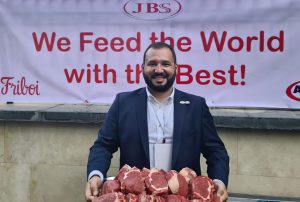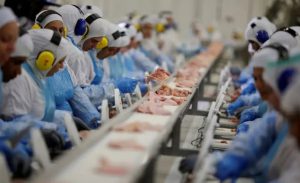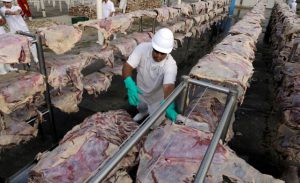GUSTAVO FONSECA Export Department MENA-Beef Division
 I studied Economics and have been in the beef business since 2011, and in recent years my main focus has been the Middle East and North Africa. In 2019, I moved to Dubai to oversee beef exports across the region. I visit Iran around every two months, and I really look forward to my visits. The Iranian people are particularly hospitable and friendly. I feel very safe when I’m there, almost as if I’m at home. I also love the food. Nothing tastes better than a proper shishlik, marinated for 12 hours, and cooked on the grill.
I studied Economics and have been in the beef business since 2011, and in recent years my main focus has been the Middle East and North Africa. In 2019, I moved to Dubai to oversee beef exports across the region. I visit Iran around every two months, and I really look forward to my visits. The Iranian people are particularly hospitable and friendly. I feel very safe when I’m there, almost as if I’m at home. I also love the food. Nothing tastes better than a proper shishlik, marinated for 12 hours, and cooked on the grill.
On the occasion of the 200th year anniversary of Brazil’s independence from Portugal and the upcoming Republic Day, please tell our readers about Brazil’s food culture (including your amazing meat BBQ) and its Agri-food industries. What makes Brazil so special when it comes to the food industry, especially meat?
When I think of Brazilian food, I think about quality and natural meat, lightly salted, cooked over a traditional BBQ before being enjoyed with friends and family. That’s how so many Brazilians celebrated 200 years of our country’s independence. Brazilians love meat – we eat it three times more than Europeans. But it’s a love we’re happy to share. We’re the world’s biggest exporter of beef – and all kinds of meat. Along with great potential for beef production, Brazil has focused on developing production efficiency, genetic improvement and sustainability in recent years, resulting in animals with better genetics, younger age and higher quality meat. And Iran is an important market for us that benefits from the recent improvements of Brazilian beef. Many Iranians will recognize our logos: Friboi and Anglo. At Friboi, we’ve been bringing beef to Iran continuously since 2004 – supplying stores, cafes, restaurants and state-run institutions.
Which countries are the biggest export destinations for Brazil and various types of meat?
Asia is the biggest consumer of JBS beef, with mainland China, our single biggest customer. There was a time in our industry when some suppliers started to concentrate exporting all their beef to specific markets. But at Friboi we think it’s important not to abandon markets where we’ve built up strong relationships and where people really value our product. That’s why we’ve continued to supply beef to Iran – I visit the country myself around once every two months to oversee our operations, and search for new opportunities. JBS recently expanded exports in 2020 to 11 new countries through its subsidiaries in Brazil: Seara and Friboi. We now supply beef and chicken to Indonesia, Liberia, Antigua and Barbuda, Senegal, Mauritius, Kazakhstan, Trinidad and Tobago, Uzbekistan, Nigeria, Vietnam, and Ethiopia. But even as we expand, Iran continues to be a crucial market for us.
Brazil is the world’s largest beef exporter, it’s expected to hold the top spot this year too.
What are the key trends in the meat industry in general? How can the industry survive or even thrive while staying relevant and environmentally friendly?
As you know, the conflict between Russia and Ukraine has been very disruptive to global food supplies – particularly in the MENA region. So many countries including Iran, are concerned about food security. Beyond that, there is a lot of focus on making our production more sustainable to reduce carbon emissions. We’re investing in a range of technologies to lower our carbon footprint: like harvesting biogas from animal waste. By January 2023, we will have expanded our fleet of 100%-electric refrigerated trucks from 19 to 200. In March 2021, JBS announced the commitment to achieve net-zero greenhouse gas emissions by 2040. In April 2021, JBS initiated the operations of the Transparent Livestock Farming Platform that extends socioenvironmental monitoring to suppliers of cattle using blockchain technology. 100% of cattle suppliers of JBS shall be part of the program by the end of 2025. We already have 15 Green offices working to provide environmental, legal and technical consultancy. Also in 2021, JBS announced six sustainable development projects to receive investments under the Fund for the Amazon. The Fund aims to finance the sustainable development of the local communities in the Amazon Biome, with initiatives that involve bio economy, reforestation and technological development.
Please tell us about JBS; the history, product portfolio, key facts including growth statistics and future plans.
JBS began in 1953 as a small family business in Brazil. Over the years, by focusing on quality and delivering value and taste to our customers, we have steadily grown from strength to strength. We have bought up other meat producers across the world from the USA to Europe and Australia. This year, JBS became the biggest food producer in the world. Next year we will mark our 70th anniversary. As I reflect on how this humble family business grew to outperform the biggest companies in the USA and Europe, I think about our customers who helped us to get there, and all the families that JBS now serves around the world, from Iran to Australia.
Please tell us about JBS’s history, activities and success in Iran?
What is your business model in Iran (direct presence, partnership etc.) and who are your main clients in Iran (government, private sector companies, individual importers)?
JBS – through Friboi – has been supplying meat to Iran continuously since 2004. The world and market conditions have changed a lot in that time. But even when the political climate makes things difficult, families still need to eat. So, our commitment is to be there for the people who enjoy our food – whether that’s by supplying restaurants, or stores or working through other outlets. In addition, there is a presence of JBS with a team based in Tehran led by Mr Hussein Paymozd with the purpose to build up strong supportive relationships and offer a higher level of service to our customers; What we believe makes all the difference for the success in the Iranian market. Unfortunately, as Iranians know all too well, the last few years have been difficult. A few years ago, Brazil was exporting 130,000 tons of beef to Iran per year. But since 2019, due to sanctions, covid and other disruptions, that consumption has decreased to 40,000 tons a year. We’re not going away. We’re starting to see a recovery, and we hope to see that continue.
Iran has “food security” on top of its national strategy agenda.
How can JBS contribute to that? Any plans to start cattle farming or modern slaughterhouses in Iran at some point?
Unfortunately, the climate in Iran is not ideally suited to large-scale cattle farming. So, at the moment we don’t have plans to raise cattle in Iran. However, as part of our operation, we have a specialist Iranian team working at our facilities in Brazil. They work hard to ensure that all meat destined for Iran is butchered properly, in accordance with Religion Shia Halal customs. This is overseen by a team of Iranian clerics – each one coming to Brazil for three months at a time, to ensure that everything is done correctly, according to Shia tradition. JBS has a strategy to expand our presence in the manufacturing and distribution of prepared foods, making the company a leader in the Halal market. JBS aims to increase total sales in the Middle East and North Africa in the next five years.





